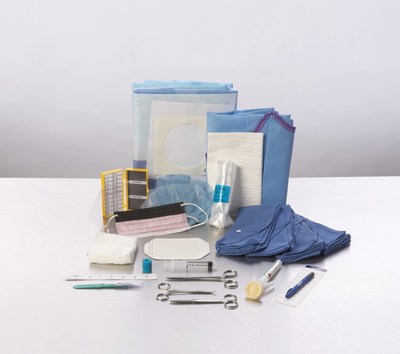Preparing for supply chain disruptions in the healthcare sector
Medline Canada shares insights on healthcare supplies inventory planning
MISSISSAUGA, ON, Aug. 11, 2022 /CNW/ - In March 2020, when COVID-19 was beginning to shut down Canadian society, shelves in stores across the country quickly went empty. Businesses found themselves struggling to keep up with demand.

Since then, supply chain shortages have impacted multiple sectors, including healthcare. Labour disruptions and shortages, transportation problems, a lack of raw materials and rising inflation have all intertwined to create this problem. It's led to healthcare settings like hospitals "getting creative" with their supplies. [1]
According to Roger Bourbonnais, Senior Vice President of Acute Care and Skin Health at Medline Canada, Corporation, while getting creative is one way to weather problems in the supply chain, setting up a smart system is most effective in tackling the issue. Bourbonnais offers these planning considerations to help healthcare providers better prepare for supply chain impacts:
Take control of how you buy
Supply costs are one of the most significant expenses for healthcare facilities. Consolidating to a single vendor is a proven way to lower costs. During this process, you could also consider product standardization to optimize quality-price value and improve practice consistency with a customized formulary focused on clinical outcomes over brand name.
Ensure you have good data
When you have a better handle on your data, you can better understand what's happening in your supply chain. Fifty-six percent of CEOs say they are concerned about the integrity of the data they use for decision-making. [2] Collecting data and keeping it organized is vital. Equally as important is maintaining your datasets. This includes data cleansing, going through and ensuring everything is up to date and accurate.
Leverage your data
A lot of work goes into negotiating supply contracts and savings. Don't let this hard work go to waste. Ensuring clinical staff order from those formularies and that you're getting the contracted price is crucial. Additionally, building out software infrastructure so there's real-time visibility into spend is another critical step to ensure you're optimally using your data.
Automating your processes
Over and understocking, supply hoarding, expired products and labour-intensive manual restocking processes quickly drive-up operating expenses. By leveraging automated systems for inventory management, you have an opportunity to improve costs and simplify workflow. This could mean tracking and managing inventory to all care points within your system using a comprehensive technology-powered platform.
Tackling supply chain issues in healthcare can't be a solo effort – leverage your supply partners to help you optimize foundational supply chain logistics, deliver operational excellence and strategically prepare for whatever supply chain impact happens next – whenever it happens.
Medline Canada, Corporation
Medline is a leading global manufacturer and provider of high-quality medical products and services to the healthcare industry. Our expertise in healthcare solutions throughout the continuum of care, coupled with the scale and agility of our supply chain, allows us to partner with our customers to enhance patient care, improve clinical outcomes, drive effective cost management and provide fast access to quality products.
By applying our CARES values every day, in all that we do, Medline Canada is deeply committed to the health and wellbeing of our customers, employees, partners and communities. With more than 550 employees, including 125 dedicated sales and clinical professionals, and eight distribution centres located across Canada, we are a trusted partner in delivering the healthcare needs of Canadians from coast-to-coast – Together Improving Care™. For more information, visit: www.medline.ca

SOURCE Medline Canada, Corporation
